- rockhill@wildlifeanimalcontrol.com
Call 24/7 for a free quote:
803-310-6617
Rock Hill Wildlife Animal Control
Professional Wildlife Removal Company Servicing Rock Hill, SC
If you have a problem with wildlife in your Rock Hill home, your best option is to hire a company that specializes in South Carolina wildlife removal only. This is a specialty business, and regular pest control companies do not use the proper techniques to solve animal problems. I have spent many years reviewing South Carolina and Rock Hill, and I recommend the following:
PCA Wildlife, LLC
Cell Phone: 803-310-6617
NOTE: If you have a dog or cat problem, call York County Animal Services: (803) 628-3190

PCA Wildlife, LLC specializes primarily in removing animals from attics of homes and buildings - this includes squirrels in attics, raccoons, and rats or mice in homes. South Carolina also has a documented problem with
bats in buildings, and PCA Wildlife, LLC is specially trained in bat removal. They also perform general wildlife trapping services, such as the capture and removal of skunks or opossums on the
property. Call 803-310-6617 to discuss your critter problem and schedule a same-day or next-day appointment. Click here to learn more about what prices we charge in 2020.
When hiring a company to solve your wild animal problem, you want these features:
- Specializes in wildlife removal, not pest control
- Fully South Carolina and York County licensed and insured
- Works 7 days per week (critters don't take weekends off)
- Performs full building inspections: enters and inspects attic
- Performs exclusion repairs, with guarantee against animal re-entry
- Offers cleanup of biohazardous wildlife waste
PCA Wildlife, LLC is a full-service Rock Hill wildlife removal company. This is very different from a regular Rock Hill pest control company. The pest control companies spray poison to kill insects. This is not at all
similar to wildlife removal. PCA Wildlife, LLC performs a full inspection of the home or property, and determines why the animal(s) are there, and if inside a building, how the animals got inside. All
animals (including rodents) are trapped and removed, or if possible, removed from the building using special exclusion devices. Once the animals are gone, preventative repairs are essential, and
cleanup is sometimes recommended.
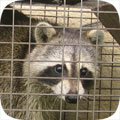 Rock Hill wildlife trapping - it's not as simple as it may seem. It's illegal in South Carolina to trap without a license. Trap type is very important and there are many different types, bait is somewhat relevant, trap placement
is vital, and there are dozens of small things that are very important to know.
Safety is a concern. Then once the animal is trapped, it must be removed and dealt with in the proper manner according to South Carolina law. We offer Rock Hill raccoon removal. Read more about how to get rid of raccoons.
Rock Hill wildlife trapping - it's not as simple as it may seem. It's illegal in South Carolina to trap without a license. Trap type is very important and there are many different types, bait is somewhat relevant, trap placement
is vital, and there are dozens of small things that are very important to know.
Safety is a concern. Then once the animal is trapped, it must be removed and dealt with in the proper manner according to South Carolina law. We offer Rock Hill raccoon removal. Read more about how to get rid of raccoons.
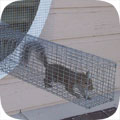 Animals in attics - this is our specialty at PCA Wildlife, LLC. Many types of animals like to live in attics. This includes squirrels, raccoons, rats, mice, bats, birds, and even possums. Critters like to go into attics for a safe place to live
and raise their young. Removing animals from attics is very complex work, partly because of the presence of baby animals. If you need Rock Hill squirrel removal, we can remove all the squirrels from your attic, and seal out any future ones. Read more about how to get rid of squirrels.
Animals in attics - this is our specialty at PCA Wildlife, LLC. Many types of animals like to live in attics. This includes squirrels, raccoons, rats, mice, bats, birds, and even possums. Critters like to go into attics for a safe place to live
and raise their young. Removing animals from attics is very complex work, partly because of the presence of baby animals. If you need Rock Hill squirrel removal, we can remove all the squirrels from your attic, and seal out any future ones. Read more about how to get rid of squirrels.
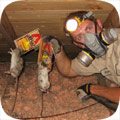 Rodent control must be done in a very specific way. First off, the most important thing is that all the openings that rats and mice can use to enter a house be sealed. Then all the rodents must be physically trapped and removed.
Never, ever use poison! Most Rock Hill exterminators will just use this lazy poison technique to kill rodents, and it causes more harm than good - dead stinky rats, and it doesn't solve the problem. Call us for correct Rock Hill rat removal. Read more about how to get rid of rats.
Rodent control must be done in a very specific way. First off, the most important thing is that all the openings that rats and mice can use to enter a house be sealed. Then all the rodents must be physically trapped and removed.
Never, ever use poison! Most Rock Hill exterminators will just use this lazy poison technique to kill rodents, and it causes more harm than good - dead stinky rats, and it doesn't solve the problem. Call us for correct Rock Hill rat removal. Read more about how to get rid of rats.
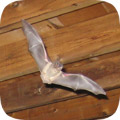 Bat removal is a highly specialized task. South Carolina is known to have colonizing bats who often live in buildings. Bats love attics. If not removed, the colony can grow to a very large size over the years. The bat droppings are often corrosive and
cause health risks. The same goes for bird droppings on or in buildings. We perform Rock Hill pigeon removal and bird control. But our specialty is Rock Hill bat removal. We remove 100% of the bat colony and seal the building so that it's totally bat-proof. Read more about how to get rid of bats.
Bat removal is a highly specialized task. South Carolina is known to have colonizing bats who often live in buildings. Bats love attics. If not removed, the colony can grow to a very large size over the years. The bat droppings are often corrosive and
cause health risks. The same goes for bird droppings on or in buildings. We perform Rock Hill pigeon removal and bird control. But our specialty is Rock Hill bat removal. We remove 100% of the bat colony and seal the building so that it's totally bat-proof. Read more about how to get rid of bats.
 If you have animals inside a house, no job is complete without proper exclusion repairs. If you simply hire a Rock Hill trapper who only removes the critters, then the problem will return. You need to hire a Rock Hill wildlife control company that identifies 100% of the animal entry points
into your building, and seals them shut with professional repairs. In addition, in many cases animals have left waste or contamination behind, and you'll want a company that can provide professional cleaning services. PCA Wildlife, LLC does both.
If you have animals inside a house, no job is complete without proper exclusion repairs. If you simply hire a Rock Hill trapper who only removes the critters, then the problem will return. You need to hire a Rock Hill wildlife control company that identifies 100% of the animal entry points
into your building, and seals them shut with professional repairs. In addition, in many cases animals have left waste or contamination behind, and you'll want a company that can provide professional cleaning services. PCA Wildlife, LLC does both.
The above are just some of the services offered by PCA Wildlife, LLC. We also trap and remove animals that destroy lawns, such as moles, or digging animals. Sometimes animals like opossums will live under buildings, steal pet food, raid garbage cans, etc.
Read about how to get rid of opossums. Skunks commonly live under sheds or decks, and set up a den. We can trap and remove them without them spraying. Read about how to get rid of skunks. PCA Wildlife, LLC
also provides dead animal removal in Rock Hill. If you need help with any other wildlife conflict, from a fox, beaver, groundhog, or any other critter, we can solve it. We also do Rock Hill snake removal - most of the snakes in South Carolina are not venomous, but
call us if you want safe removal, or read about how to get rid of snakes in Rock Hill. And remember, we are a private business, not York County Animal Control Services, so if you have a dog or cat problem, call the County at (803) 628-3190.
York County animal services does not handle any wildlife issues.
PCA Wildlife, LLC: 803-310-6617
Rock Hill Pricing Info For Year 2020
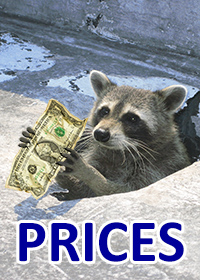 Every wildlife removal situation is different, from the species of animals involved, the location of the animal inside a house or outside, the extent of repairs or cleanup, etc. It's impossible to give one-size-fits-all prices. Examples MIGHT include:
Every wildlife removal situation is different, from the species of animals involved, the location of the animal inside a house or outside, the extent of repairs or cleanup, etc. It's impossible to give one-size-fits-all prices. Examples MIGHT include:
Small Job: For example, a one-stop job to remove an animal in the yard: $100 on up
Medium Job: For example, getting critters out of your house with minor repairs: $300 on up
Large Job: For example, a project involving many service trips and complex work: $500 on up
Give us a phone call now and tell us about your wildlife issue and we will be able to give you a price estimate over the phone. If you're cool with it, we can schedule a same-day or next-day appointment if you like. Our prices are fair, and a good value because we do the job right, the first time.
Rock Hill Wildlife Tip #1:
What to do about wild critter feces in the yard - Animals don't mean to be as gross as they are, but unfortunately it just kind of happens. When an animal has to go to the toilet, they have to go to the toilet and there is not very much that you can do about it. However, if you have noticed that your family dog or cat is pooping in places that it usually wouldn't, resulting in a rather stern telling off from you, you should probably reevaluate the situation to make sure that the culprit really is who you think it is! Wild critter poop is the same size as the poop that your average medium sized house dog will leave behind, which is why it is often mistaken for dog poop. The only problem with this is that the poop left behind by the wild critter is likely to contain some rather nasty bugs that you are not going to want to put yourself in contact with, and also that you will need to clean up n the safest way possible! Gloves - this cannot be stressed enough - you are going to need some very sturdy, very strong, preferably rubber gloves. These will keep you protected. You will also need bleach to clean the materials that the poop has come into contact with, especially the gloves if you have decided that you don't want to throw them away. At the same time, you are either going to want carrier bags to contain the poop and handles to tie the garbage can lid down with after you have placed the poop in there, or a bonfire so that you can burn it and get rid of it once and for all!
Rock Hill Wildlife Tip #2:
Will a possum eat rat poison? - There are many methods to remove a possum from your home or land, that rat poison is definitely not the best way forward, especially when you consider the dangers and negatives that surround the topic. You could inadvertently poison your own household pets or small children, as well as potentially causing harm to other pets in the neighborhood and other forms of wildlife, and it would make sense to look more towards the idea of kill traps or more humane methods to remove the animal, that relying on this very painful and long way to remove the animal from your life. One of the most popular forms of rat poison contains something called an anticoagulant, which means that the blood will not clot. Now, in rats this process will take a few days to kill the animal, but with a possum, it can take several weeks, and when you consider all of the other problems that will accompany this form of extermination, and the other causes that will lead to the animals demise, it would certainly cause you to think again. The anticoagulant will affect the Vitamin K synthesis in the liver, which means that the blood will not clot. This can lead to anemia, internal bleeding and blood loss, as well as many other problems, which as you can very well imagine, would be a very long and painful death to have to suffer. Although there are pros and cons for all forms of possum removal, there are other more humane methods in which to remove the problem from your life. You could accidentally kill your own pets, as well as community pets and other wild creatures, and that is before you even begin to think about the harm the poison could do to any small children that may live in the neighborhood. All in all, this should be the last form of removal that you consider, especially if you want the animal to be removed quickly and painlessly, for all involved!
South Carolina Wildlife Information:
South Carolina State bird: Carolina wren, wild turkey
State mammal: White-tailed deer
State reptile: Loggerhead sea turtle
State amphibian: Spotted salamander
State fish: Striped bass
State insect: Carolina mantis
South Carolina is a coastal state, but its sandy shores extend much further inland than you might expect. Millions of years ago, the ocean coast was much different from what it is now, and the center of the state still shows evidence of ancient sand dunes from that time period. Despite the sandy soil, much of South Carolina has reverted back to forest, though the state is relatively flat except for a small patch of the Blue Ridge Mountains in the upper corner. South Carolina gets the best of both worlds-terrestrial and marine animals all in one state.
The marine animals seen by beach-goers are nothing short of amazing. South Carolina sees a number of different whale species. There are also dolphin pods, and porpoises that leap through the waves. Unfortunately, like any state along the coast, seagulls take full advantage of people on the sand, going so far as to steal food right out of people's hands. Not only do the gulls harass tourists, they create problems for local businesses and homeowners. The droppings from the birds are very corrosive.
Inland, the seagulls aren't so powerful. The animal ruling the territories in South Carolina is the alligator. Though not as densely populated as in some states, alligators are in much of the southern part of South Carolina, where the temperatures are more consistent. More widely distributed through the state are coyotes and black bears. There are also red wolves, grey wolves, and mountain lions in South Carolina.
White-tailed deer and wild hogs tend to be the most common grazers in this state. Many years ago, there were both herds of bison and of elk, but deforestation and hunting have made both species extinct to South Carolina. Any bison herds present are privately owned.
Nuisance animals live in South Carolina, just as they live in most other states. This region is ideal for pest critters like raccoons, skunks, opossums, rats, mice, and bats. Due to warmer temperature, bats can be particularly problematic because they do not need to migrate away from their roost if it is inside of a home.
South Carolina also has a number of snakes due to the warm, humid weather. Of the four venomous snakes in the United States, South Carolina has them all. There are cottonmouths, copperheads, coral snakes, and several species of rattlesnakes.
You can always call PCA Wildlife, LLC, any time of day, at 803-310-6617, for a price quote for Rock Hill wildlife control services. I am confident that this is the best choice amongst wildlife removal companies in Rock Hill, SC.





































